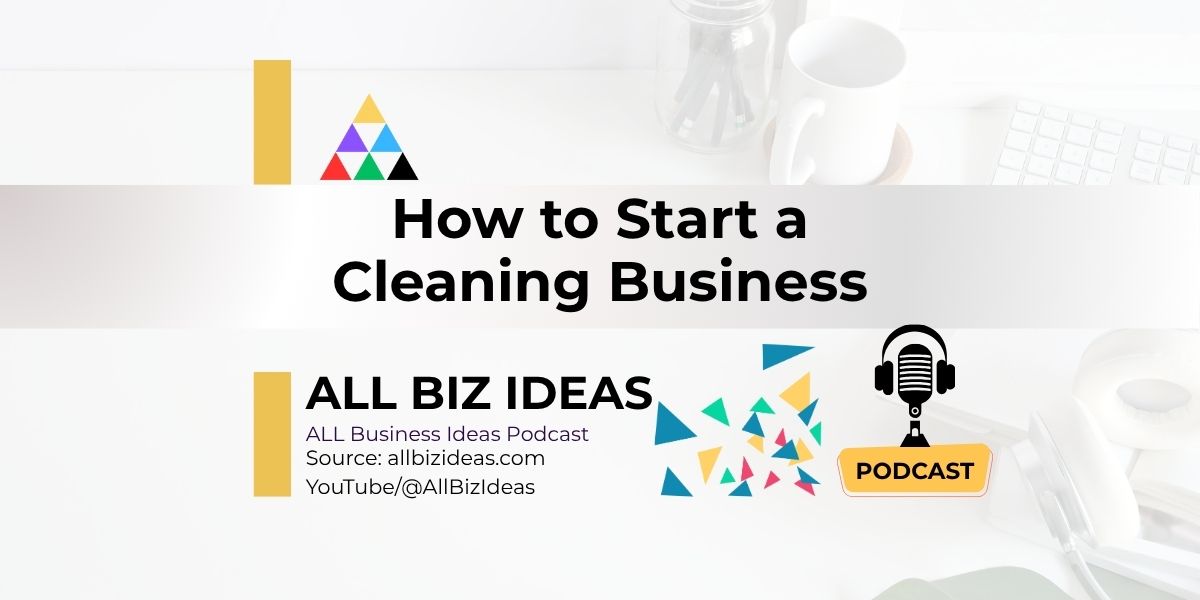How to Start a Cleaning Business | A Data-Driven-Clean Guide
Thinking about how to start a cleaning business? You’re not alone—and you’re definitely onto something. The cleaning industry is booming, thanks to our ever-busier lives and heightened focus on hygiene, both at home and in the workplace. But here’s the good news: this is one of the few businesses you can start with minimal upfront investment, flexible hours, and the potential for recurring income.
In this guide, we’ll walk you through the essentials on how to start a cleaning business: what makes a cleaning business stand out, step-by-step instructions for getting started, a breakdown of costs, tools you’ll need, how to market yourself—and whether to start with residential or commercial cleaning.
Let’s get into it.
Frequently Asked Questions
1. What is the "Data-Driven Clean" approach, and why is it important for a cleaning business?
The “Data-Driven Clean” is a distinctive value proposition that moves beyond generic promises of “thorough” or “professional” service to offer measurable results. It involves using cleaning checklists to ensure no detail is missed, gathering client feedback through surveys after each job, tracking client satisfaction over time, and adjusting service quality and staff training based on this real data.
This approach is crucial because it differentiates a cleaning business in a competitive market, provides clients with peace of mind through accountability, fosters a culture of continuous improvement within the team, and makes the business more scalable and review-friendly. It doesn’t require complex technology; simple tools like spreadsheets, Google Forms, or basic CRM software can facilitate it.
2. What are the initial steps and legal requirements for starting a cleaning business?
To start a cleaning business, the first step is to decide on your focus: residential or commercial cleaning, as this impacts equipment and scheduling. Next, you need to complete the legal and administrative setup, which includes choosing and registering a business name (an LLC is often recommended for liability protection), obtaining an Employer Identification Number (EIN), purchasing liability insurance, and getting bonded (especially for commercial work).
You’ll also need to apply for any required local business licenses or permits. Finally, it’s advised to create a simple business plan outlining your target clients, services, pricing, equipment needs, brand values, and revenue goals.
3. What are the estimated startup costs for residential versus commercial cleaning businesses?
The estimated startup costs vary significantly between residential and commercial cleaning.
For residential cleaning, you can expect to spend approximately $500–$1,000. This covers essential items like cleaning supplies ($50–$100), a HEPA filter vacuum ($150–$300), mops, buckets, and microfiber cloths ($100), uniforms or branded t-shirts ($50–$100), and optional scheduling/invoicing software ($20–$40/month).
For commercial cleaning, the costs are higher, ranging from $1,500–$4,000, or even more for rapid scaling. This includes the residential cleaning essentials plus more specialized equipment such as an industrial floor scrubber ($500–$1,000, or rent for $50–$100/week), a carpet extractor ($300–$600), a large-capacity vacuum ($200–$400), and PPE/wet floor signs ($100). A business vehicle is also an optional but potentially significant cost ($3,000–$10,000 for used). Costs can be reduced by starting small, buying used equipment, or focusing on services that don’t require heavy machinery.
4. How should a cleaning business price its services and market itself effectively?
For residential cleaning, typical charges range from $30–$60 per hour, or $100–$250 per clean, depending on the size of the home and service type.
For commercial cleaning, pricing is often $0.05–$0.25 per square foot or contract rates of $500–$2,500/month. A good strategy is to offer three service tiers (e.g., Basic, Deep, Premium) to provide options and facilitate upsells.
Effective marketing focuses on local presence, trustworthiness, and being personable. Key strategies include creating a Google Business Profile, listing on Yelp, Angi, and Nextdoor, and actively requesting client reviews. Building a simple website that highlights services, prices, booking options, and the “Data-Driven Clean” advantage is also crucial. Social media can be used for before-and-after photos, cleaning tips, testimonials, and giveaways.
Finally, partnering with local businesses like realtors, Airbnb hosts, office managers, and property managers through business card drops, sample cleanings, or referral deals can generate leads.
5. What specific tools can help implement the "Data-Driven Clean" system?
Implementing the “Data-Driven Clean” system doesn’t require advanced technology but benefits from simple, organized tools.
For collecting client feedback, Google Forms or Typeform are recommended. To track checklist completion and performance scores, tools like Trello, Notion, or Airtable can be used. For sending automated surveys and reminders, a CRM (Customer Relationship Management) system such as Jobber or ZenMaid is helpful.
Lastly, spreadsheets are effective for tracking performance scores and maintaining improvement logs. The goal is to consistently collect, analyze, and act upon data to ensure quality and build trust.
6. What is the difference between residential and commercial cleaning, and which one is better to start with?
Residential cleaning typically involves cleaning homes and is ideal for solo entrepreneurs or small teams due to flexible scheduling (mornings/afternoons) and frequent repeat clients (weekly, bi-weekly, monthly). Services often include deep cleans, move-outs, and vacation rental turnover.
Commercial cleaning, on the other hand, deals with businesses like offices, medical buildings, schools, and retail spaces. It often involves higher volume contracts with potentially better margins, but typically requires evening/night or early morning work and more equipment or a team.
Many founders find it easier to start with residential cleaning solo, as it requires less upfront investment and can be scaled into commercial cleaning as the business grows and a team is built.
7. How can a cleaning business build trust and transparency with clients using the "Data-Driven Clean" system?
The “Data-Driven Clean” system actively builds trust and transparency with clients through several mechanisms. Firstly, sharing the completed cleaning checklist with the client after every job demonstrates accountability for all tasks. Secondly, including a feedback form link in follow-up messages encourages open communication and shows that the business values client input for improvement.
Finally, offering a “Quality Guarantee” — promising to fix anything missed within 24 hours — reinforces commitment to high standards and client satisfaction. These actions collectively assure clients of consistent quality and a proactive approach to service.
8. Who is a cleaning business ideal for, and why is the industry currently booming?
Starting a cleaning business is ideal for individuals who are detail-oriented, dependable, punctual, and willing to work hard. It suits those who don’t mind getting their hands dirty and enjoy providing a valuable service.
The cleaning industry is currently booming due to several factors: people’s increasingly busy lifestyles, which leave less time for cleaning, and a heightened focus on hygiene and sanitation, particularly after the pandemic. This high demand, coupled with the relatively low startup costs and the potential for recurring income, makes cleaning services a lucrative and accessible business opportunity for many entrepreneurs.
A Value Proposition That Sets You Apart: “The Data-Driven Clean”
Most cleaning companies promise “thorough” or “professional” service. But what if your business could promise measurable results? That’s where the “Data-Driven Clean” comes in.
This means:
- Using checklists to ensure no corner is missed.
- Gathering feedback after each job (via text or email surveys).
- Tracking client satisfaction over time.
- Adjusting service quality and training based on real data.
It shows clients that your team doesn’t just clean—we improve. And that’s something few competitors emphasize. You don’t need fancy tech to do this—just intentional follow-up and simple tracking tools (like spreadsheets or CRM software).
Sample: “Data-Driven Clean” System on how to start a cleaning business
This system is designed to:
- Ensure consistent cleaning quality
- Collect and use client feedback
- Create a performance score to train and motivate staff
- Build trust and transparency with customers
Cleaning Checklist (Example: Residential Deep Clean)
| Date: | Cleaner: | |||||||||||||||||
| Client: | ||||||||||||||||||
| Cleaner Task Checklist | ||||||||||||||||||
| Use this checklist to ensure all tasks are completed during each cleaning session. Tick off each task as it’s finished. | ||||||||||||||||||
| General Areas (Living Room, Bedrooms, Hallways) | ||||||||||||||||||
|
| Kitchen | ||||||||||||||||||
|
Data-Driven Clean: Client Quality Feedback Checklist (1–5 Rating Scale)
Client Name: _______________________
Date of Service: _______________________
Cleaner(s): _______________________
Service Type: ☐ Standard Clean ☐ Deep Clean ☐ Move-In/Out ☐ Commercial
CLEANING TASKS & QUALITY RATING
Rating Scale:
1 = Poor · 2 = Fair · 3 = Good · 4 = Very Good · 5 = Excellent
Cleaning Task | 1 | 2 | 3 | 4 | 5 | Notes (optional) |
Dust all surfaces (shelves, baseboards, etc.) | ☐ | ☐ | ☐ | ☐ | ☐ | |
Vacuum and mop all floors | ☐ | ☐ | ☐ | ☐ | ☐ | |
Clean & disinfect kitchen (counters, sink) | ☐ | ☐ | ☐ | ☐ | ☐ | |
Clean appliances (microwave, oven, fridge ext.) | ☐ | ☐ | ☐ | ☐ | ☐ | |
Sanitize bathrooms (toilet, sink, tub) | ☐ | ☐ | ☐ | ☐ | ☐ | |
Clean mirrors and glass surfaces | ☐ | ☐ | ☐ | ☐ | ☐ | |
Empty trash bins and replace liners | ☐ | ☐ | ☐ | ☐ | ☐ | |
Spot clean walls and doors | ☐ | ☐ | ☐ | ☐ | ☐ | |
Final walkthrough for overlooked spots | ☐ | ☐ | ☐ | ☐ | ☐ |
OVERALL EXPERIENCE
Category | 1 | 2 | 3 | 4 | 5 | Notes (optional) |
Punctuality of cleaner | ☐ | ☐ | ☐ | ☐ | ☐ | |
Professionalism and communication | ☐ | ☐ | ☐ | ☐ | ☐ | |
Overall satisfaction with cleaning | ☐ | ☐ | ☐ | ☐ | ☐ | |
Likelihood to recommend us | ☐ | ☐ | ☐ | ☐ | ☐ |
OPEN FEEDBACK (Optional)
- What did you appreciate the most?
- Is there anything we could improve next time?
Return Options:
☐ I’ll submit this digitally via email or feedback form
☐ I’ve left this form with the cleaner or in the designated area
Cleaning Performance Score
Used internally to track cleaner performance over time.
Formula:
(Avg. Client Rating + Completion % from Checklist) / 2
Example:
- Client feedback avg: 4.5
- Checklist completion: 100%
- Performance Score = (4.5 + 5) / 2 = 4.75
Track this monthly to reward top performers or identify training needs.
Cleaning Monthly Quality Audit
Once per month:
- Randomly select 2–3 clients
- Do a spot call or second visit for audit
- Check for overlooked details (vents, baseboards, under furniture)
- Use the score for team training
Cleaning Transparency with Clients
Use the Data-Driven Clean to build trust:
- Share cleaning checklist after every job
- Include feedback form link in follow-up message
- Offer a “Quality Guarantee”—if something’s missed, you fix it within 24 hours
- Tools to Use
- Google Forms or Typeform for client feedback
- Trello, Notion, or Airtable to track checklist completion and scores
- CRM (e.g., Jobber, ZenMaid) to send automated surveys and reminders
- Spreadsheets for performance score tracking and improvement logs
Why ‘Data-Drive-Clean’ Works for Your Cleaning Business
ON how to start a cleaning business, implementing a “Data-Driven Clean” system strategy can:
- Differentiates you in a crowded market
- Gives clients peace of mind that you’re accountable
- Builds a culture of improvement within your team
- Makes your business more scalable and review-friendly
Step-by-Step: How to Start a Cleaning Business
Step 1: Decide Your Focus – Residential or Commercial?
- Residential Cleaning
Ideal for solo entrepreneurs or small teams
Flexible scheduling (mornings, afternoons)
Frequent repeat clients (weekly, biweekly, monthly)
Services like deep cleans, move-outs, and vacation rental turnover
- Commercial Cleaning
Higher volume contracts, often with better margins
Typically evenings/nights or early mornings
Requires more equipment and sometimes a team
Offices, medical buildings, schools, retail spaces
Start with what you can handle. Many founders begin with home cleaning solo, then grow into commercial as they build a team.
Step 2: Legal & Administrative Setup
- Choose a business name
- Register your business (LLC is common for liability protection)
- Get your EIN (Employer Identification Number)
- Purchase liability insurance and get bonded (especially important for commercial work)
- Apply for any local business licenses or permits
Estimated cost: $300–$800 depending on your state and business structure
Step 3: Create a Simple Business Plan
It doesn’t need to be 50 pages. Just outline:
- Who you’re serving (busy families, real estate agents, office managers)
- What you offer (basic cleans, deep cleans, add-ons)
- Pricing tiers
- Equipment needs
- Your brand and values (like your “Data-Driven Clean” edge)
- Revenue goals
A one-page business model canvas works great if you want to keep it light.
Step 4: Startup Costs & Equipment
Here’s a basic list of what you’ll need to get started:
For Residential Cleaning:
- Cleaning supplies (sprays, disinfectants, glass cleaner): $50–$100
- Vacuum with HEPA filter: $150–$300
- Mop, bucket, microfiber cloths, scrub brushes: $100
- Uniforms or branded t-shirts: $50–$100
- Scheduling and invoicing software (optional): $20–$40/month
For Commercial Cleaning (in addition to above):
- Industrial floor scrubber: $500–$1,000 (or rent for $50–$100/week)
- Carpet extractor: $300–$600
- Large-capacity vacuum: $200–$400
- Wet floor signs, gloves, and PPE: $100
- Business vehicle (optional): $3,000–$10,000 used
Total estimated startup costs:
- Residential: $500–$1,000
- Commercial: $1,500–$4,000 (or more if scaling fast)
You can cut costs by starting small, buying used equipment, or offering services that don’t require heavy tools (like dusting, vacuuming, and bathroom/kitchen sanitization).
Step 5: Hiring (Optional Early On)
You don’t need a team to begin. Many start solo, especially in home cleaning. But if you’re going commercial or scaling fast:
- Hire part-time cleaners or contract workers
- Conduct background checks (crucial for trust)
- Offer simple training using your checklists and quality standards
- Pay hourly ($15–$25/hour depending on location)
Step 6: Pricing Your Services
For homes, most cleaners charge between $30–$60 per hour, or $100–$250 per clean, depending on the size and type of service.
For offices, expect $0.05–$0.25 per square foot, or contract rates like $500–$2,500/month.
Pro tip: Offer three service tiers (Basic, Deep, Premium) so customers can choose their comfort level—and you can upsell.
Marketing Your Cleaning Business
Marketing doesn’t need to be complicated. Focus on being findable, trustworthy, and personable.
- Set Up Your Local Presence
- Create a Google Business Profile
- Add yourself to Yelp, Angi, and Nextdoor
- Ask early clients for reviews
- Build a Simple Website
- Include your services, prices, availability, and “Book Now” button
- Highlight your Data-Driven Clean advantage
- Include testimonials and FAQs
Tools: Hostinger (with WordPress), Squarespace. Cost: $100–$200/year
- Use Social Media
- Show before-and-after shots
- Share cleaning tips
- Post client testimonials (with permission)
- Run giveaways (e.g. “Free Clean Friday”)
- Partner with Local Businesses
- Realtors (for move-in/move-out cleans)
- Airbnb hosts
- Office managers
- Property managers
Drop off business cards, offer sample cleanings, or run referral deals (like “$25 off for you and your referral”).
Bonus Tips for Standing Out on How to Start a Cleaning Business
- Offer eco-friendly options: Many clients are looking for non-toxic, green cleaning.
- Automate reminders: Use email or text reminders before each appointment.
- Follow up: A quick “How did we do?” survey keeps you top of mind and improves your service.
Why Start a Cleaning Services Business (Residential or Commercial)
Why This Business? Cleaning services are in high demand due to people’s busy lifestyles and the need for sanitary environments, especially after the pandemic. Whether it’s residential or commercial cleaning, businesses and homeowners are always looking for reliable cleaning professionals. Starting a cleaning service is relatively low-cost, and it’s easy to scale with the right marketing and customer base.
Who Is Starting a Cleaning Business For? This business is perfect for individuals who don’t mind getting their hands dirty and enjoy providing a useful service. It’s ideal for those with an eye for detail, who are dependable, punctual, and willing to work hard. Both residential and commercial cleaning services can be lucrative, and many businesses or homeowners are willing to pay for quality, professional cleaning services.
How to Get a Cleaning Business Started? To start, gather the necessary cleaning supplies (e.g., vacuums, mops, cleaning solutions) and begin offering your services to friends, family, and neighbors to build a reputation. You’ll also want to create a website or social media presence to promote your services. It’s essential to offer transparent pricing and a reliable, consistent service to build customer trust. For commercial cleaning, approach office buildings, schools, or gyms with a professional proposal that highlights your services. You can grow by hiring additional cleaning staff and expanding your offerings to larger residential or corporate clients. Make sure to follow the ‘Data-Driven Clean’ Strategy above and download the free cleaning checklists.
Conclusion
Starting a cleaning business doesn’t require an MBA or a huge investment—just a good plan, a commitment to service, and a clear value that clients can trust. With how to start a cleaning business guide, you must focusing on quality, being responsive, and leveraging your strategic Data-Driven Clean approach, you can build a reputation that keeps your calendar full.
It’s hard work, sure—but also a business where reliability and attention to detail speak louder than flashy marketing. And the best part on how to start a cleaning business? You can start small, grow at your own pace, and build something that lasts.
Cleaning business for homes or offices are niche businesses that is worth considering.



